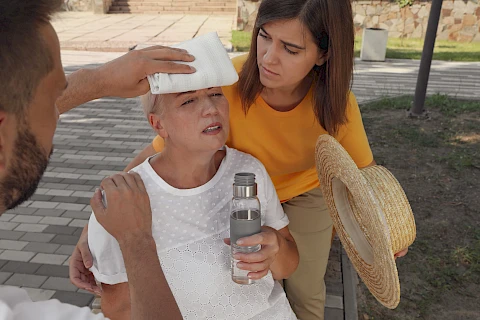
Seniors are more vulnerable to heat-related illnesses as the summer intensifies. Caregivers can ensure their safety and comfort by being aware of the danger and taking appropriate actions to prevent potential sickness. We discuss the challenges those in their golden years face in extremely warm weather and provide risk management tips.
Indications of Heat Exhaustion and Heat Stroke
Understanding the difference between heat-related illnesses is crucial for keeping older retirees safe during hot weather. Heat Exhaustion happens when the body overheats but can still sweat to cool itself down. Here are the signs:
- Heavy sweating
- Rapid pulse
- Dizziness or fainting
- Nausea or vomiting
- Muscle cramps
- Headache
- Weakness or fatigue
- Cool, moist skin with chills (can be misleading in older adults)
Heatstroke is a life-threatening condition where the body can no longer cool itself down. Here are the signs:
- Body temperature of 103°F (39.4°C) or higher
- Red, hot, and dry skin (no sweating)
- Rapid, strong pulse
- Confusion or unconsciousness
- Seizure
- Loss of consciousness
If you suspect heat-related illness in a senior, take immediate action. Move the person to a cool place, loosen clothing, offer cool fluids to drink, wet the person's skin with cool clothes, and seek medical attention.
Tips for Managing Heat-Related Illnesses
You can take several proactive steps to reduce the risk of illness caused by heat in older adults. Here are a few things you can do:
Create a Cool Indoor Environment
During hot weather, older retirees need to maintain a comfortable indoor temperature. Use air conditioning or fans to keep the temperature between 68°F and 78°F, and close curtains or blinds during the hottest parts of the day. Ensure proper ventilation by opening windows when the outside temperature is cooler.
Pay Attention to Hydration and Nutrition
Encourage older adults to drink plenty of water and hydrating fluids throughout the day. Avoid caffeine and alcohol, and provide water-rich foods like melons and cucumbers. Offer light, refreshing meals and snacks.
Use Proper Clothing and Sun Protection
When elderly loved ones go outdoors, dress them in loose, lightweight, and breathable clothing in light colors made from fabrics like cotton. Add a wide-brimmed hat and sunglasses, and apply SPF 30 sunscreen every two hours.
Adjust Daily Routines
Remember to schedule outdoor activities during cooler times of the day to avoid peak hours of warmth. Remind them to take breaks in shaded areas and monitor weather forecasts. Adjust tasks as needed for comfort and safety.
Maintain Social Connections
Regularly check on elderly loved ones to ensure they are coping with the temperature and have the support they need. Encourage indoor social get-togethers to combat isolation. Get together for cool indoor activities like board games or crafting.
Senior Helpers Can Help Manage Health Risks This Summer
Senior Helpers provides comprehensive elderly care to service our community's seniors and their families. If you live in the Centerville, Beavercreek, Oakwood, or Kettering areas, contact us today at Senior Helpers Dayton. Our caregivers provide compassionate and professional in-home care to keep your loved one safe and comfortable.